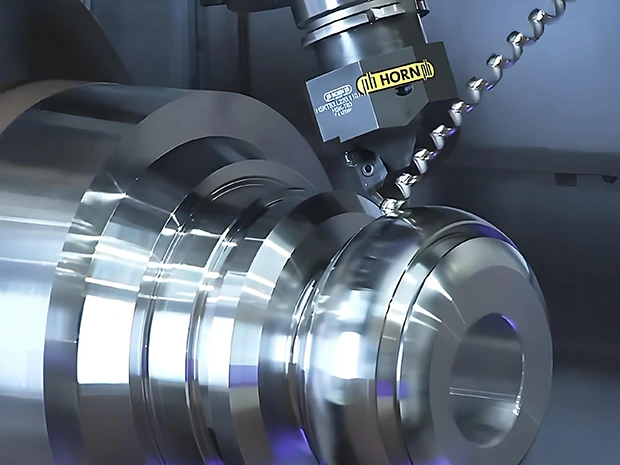CNC aluminum parts processing
Our complete aluminum alloy CNC processing capabilities provide full services for your aluminum processing projects from prototype processing to batch processing of final aluminum parts.
One-time CNC aluminum parts processing prototype




We support 24/7 processing and manufacturing
As lightweight metals are widely used, CNC aluminum parts processing is becoming the choice of many industries. With our extensive processing capabilities and experience, Aluminum alloy CNC processing has been our area of expertise for many years.
We focus on manufacturing non-standard precision aluminum parts with complex structures, Committed to delivering highly accurate and consistent parts to customers. We continually invest in new equipment and skilled employees to ensure our team maintains a strong competitive advantage, We have also been improving our aluminum processing processes to improve efficiency and quality, And continue to meet customers’ production needs.
CNC machining typically uses advanced CNC machine tools. These machine tools use computer control systems to precisely control the movement trajectories and processing parameters of the cutting tools. When processing aluminum parts, Common machine tool types include machining centers, CNC milling machines and CNC lathes, etc.
Machining centers have multiple axes, Can perform complex three-dimensional processing operations. It can automatically change tools, Achieve a variety of processing techniques, such as milling, drilling, Boring, Tapping etc.,CNC milling machines are mainly used for milling of flat and curved surfaces, CNC lathes are suitable for processing cylindrical aluminum parts.
1. Design and programming
– first, According to the design requirements of aluminum parts, Create 3D models using computer-aided design (CAD) software. Then, Convert design models into machining programs that can be recognized by machine tools through computer-aided manufacturing (CAM) software. This program contains tool paths, Cutting parameters, Feed speed and other information.
2. Material preparation
– Choose the right aluminum material, Commonly seen are aluminum alloy plates, Rod, Profiles, etc., Cut according to processing requirements, blanking, Prepare rough parts.
3. Machine tool processing
– Fix the blank on the machine table, Execute the machining program through the machine tool’s control system. The tool cuts the aluminum parts according to the predetermined path, Gradually remove excess material, Form into desired shape and size.
4. Quality inspection
– After processing is completed, Quality inspection of aluminum parts. Commonly used detection methods include three-coordinate measuring instrument, Measuring tools, etc., To ensure the dimensional accuracy of aluminum parts, Surface quality and geometry meet design requirements.
CNC aluminum parts processing is widely used in various industries, such as aerospace, automobile manufacturing, electronic equipment, Medical equipment, etc., in the aerospace field, The lightweight and high-strength properties of aluminum parts make it an important structural material, CNC machining enables high-precision aircraft parts and spacecraft assemblies. in automobile manufacturing, Aluminum parts for engine components, Body structure, etc., CNC machining ensures part quality and reliability, The electronic equipment and medical device industries have high requirements for parts accuracy and surface quality. CNC aluminum machining can also meet these needs.
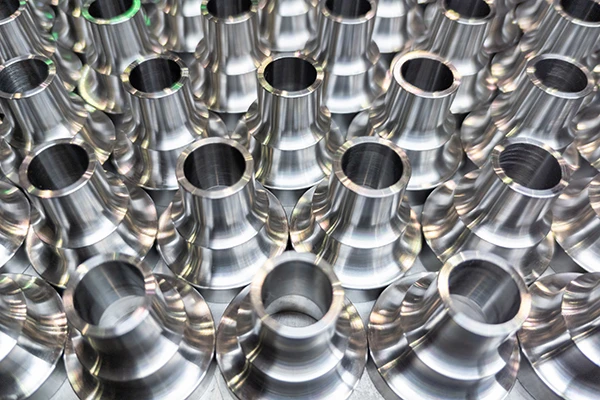
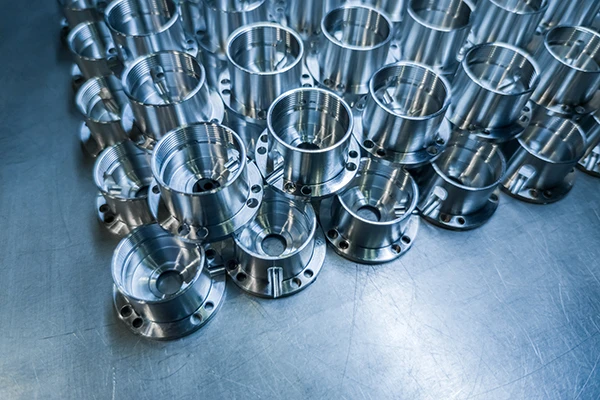
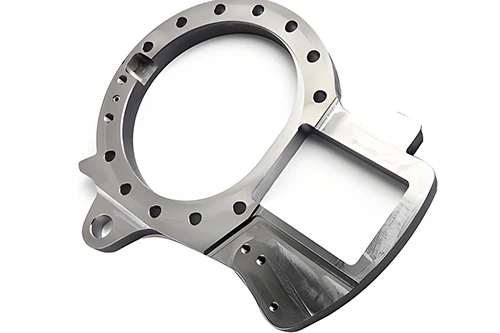
Aluminum alloy 6061
The most versatile heat-treated aluminum alloy, While retaining most of the high-quality properties of aluminum. This grade offers a wide range of mechanical properties and corrosion resistance, Easy to anodize, Good processability and weldability, It can be manufactured by most common processes, Especially CNC machining.
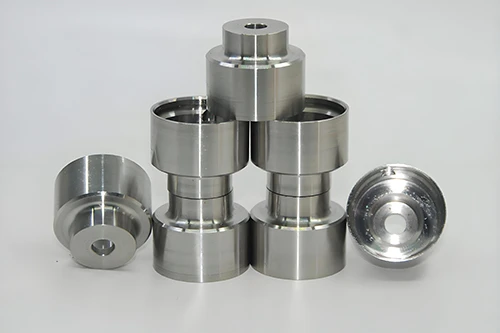
Aluminum alloy 6082
Aluminum 6082 is a medium strength alloy, Excellent corrosion resistance. It has the highest strength among the 6000 series alloys. 6082known as structural alloys, 6082Plate is the alloy most commonly used for machining. As a relatively new alloy, The higher strength aluminum 6082 has replaced 6061 in many applications.
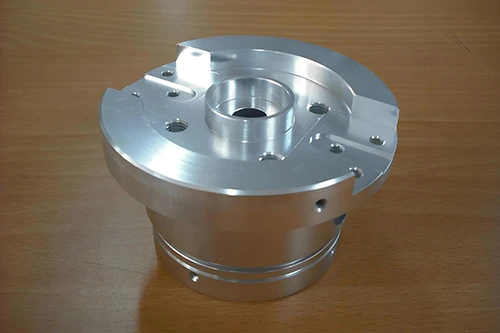
Aluminum alloy 6063
Commonly known as construction alloy, It has quite high tensile properties, Excellent processing properties and high corrosion resistance, Most commonly found in a variety of interior and exterior architectural applications and decorations. 6063It is a representative alloy for extrusion, Lower strength than 6061, Good extrudability, Can be used to form materials with complex cross-section shapes.
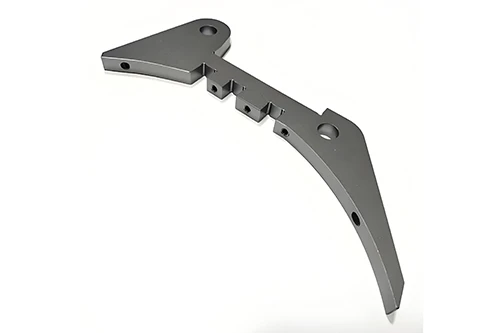
Aluminum alloy 7075
This is one of the strongest aluminum alloys available,It has an excellent strength-to-weight ratio, Ideal for use on highly stressed parts, is one of the extremely expensive alloys available. But this grade is not easy to weld, Poor corrosion resistance. 7075Aluminum is a typical material used in the aviation industry, With complex structure and high precision.
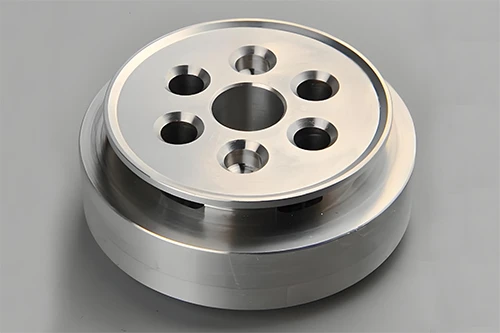
Aluminum alloy 2024
Aluminum 2024 is used in applications requiring a high strength to weight ratio as well as good fatigue resistance. It is not solderable, and has average processability. 2024Poor corrosion resistance, Not very suitable for anodizing.
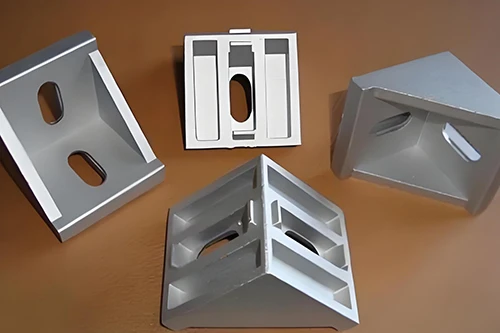
Aluminum alloy 5052
This is the highest strength alloy available in non-heat treatable grades, Corrosion resistance, Good weldability and formability, Its fatigue strength is higher than most other aluminum grades. It has good resistance to marine atmosphere and salt water corrosion, and has excellent processability.




To give you a true appreciation of our CNC aluminum parts processing standards, Here are some examples of our past processing, and sample aluminum parts crafted by senior technicians. Our team has demonstrated exceptional expertise in all types of CNC aluminum parts processing. so, If you are looking for a reliable aluminum processing company for your project, Then you don’t have to look any further!
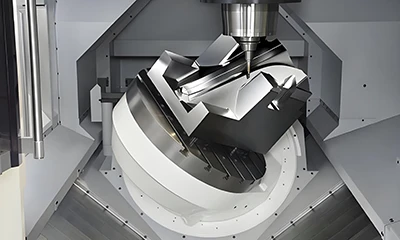
Common ways to eliminate internal stress are to use natural or artificial aging and vibration treatment。Secondly, Pre-machining of workpieces excess material, Natural aging for 1-2 hours before processing and shaping, It can also eliminate deformation caused by internal stress.
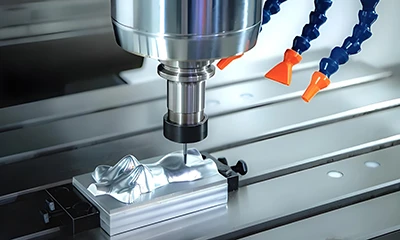
Milling of thin-walled aluminum parts with poor rigidity, The following clamping methods can be used to improve processing accuracy: Use vacuum suction cups to clamp workpieces for evenly distributed clamping force; Use the method of filling media inside the workpiece to improve the rigidity of the workpiece.
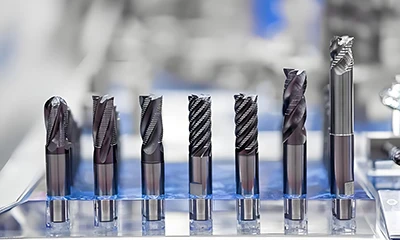
Knife material, Geometric parameters, Tool structure has an important influence on cutting performance, Correct choice of tools, Essential for improving dimensional stability in processing.
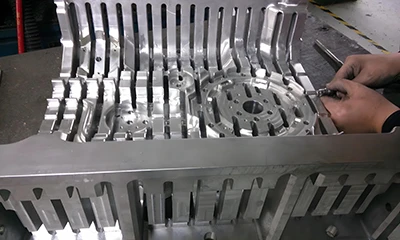
The CNC high-speed cutting process is generally: Rough machining – semi-finishing – corner cleaning – finishing and other processes. For parts with high precision requirements, Need to increase the number of semi-finishing operations, and retain a uniform machining allowance.
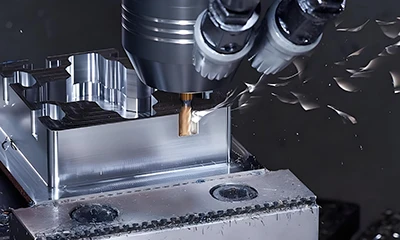
Choose the right feed rate, Spindle speed and depth of cut;
Use symmetrical processing method for the front and back sides of the workpiece, Avoid centralized processing which is not conducive to heat dissipation.
Avoid thin walls
Same as high features, Vibration increases when machining thin features. as a guide, The minimum thickness of metal thin-walled parts is 0.5-0.8mm, The minimum thickness of plastic parts is 1.0-1.5mm. If the wall is used for supporting or higher features, The wall thickness should be increased, To avoid vibration during processing.
Avoid small or raised text
You may need to mark the part with the part number or company name, Adding text looks cool, But processing is very time-consuming, Electrochemical etching or laser engraving is usually better. If you must mill text, Choose sunken rather than raised text whenever possible, Keep it simple with larger text, Font depth does not exceed 0.3mm.
Adhere to thread standards
When creating threads, It’s also important to stick to standard sizes. The larger the thread, The easier it is to process. The length should be kept to a maximum of the nominal diameter of the hole 3 times. For blind hole tapping, It is best to add at least at the root of the hole 1/2 Extra length of aperture. You may also consider using inserts, Threaded coils and copper nuts last longer than bare machined threads, Especially in materials like aluminum or plastic, and easy to install.
The largest possible interior angle
Any internal cuts will create fillets, It is half the diameter of the tool used. Milling with smaller tools takes a long time, We recommend that the radius should be larger than the machining depth 1/3. The best approach is to eliminate interior corners or allow the largest possible interior corner radius in the mating part design, and use the same radius on all inner edges, so that the same tool can be used throughout the process.
Avoid too deep cavities、Grooves and deep holes
The depth of the pocket and groove is usually related to the diameter of the tool used to machine the internal fillet. A good rule of thumb is to keep the pocket depth equal to the tool diameter 3-4 times, Or the groove depth is smaller than the feature width 4 times. Whether blind hole or through hole, Recommended maximum depth is diameter 4 times, The minimum aperture is 1 mm, And it is recommended to design standard size holes. Use a standard drill bit, Can process holes quickly and with high precision; For non-standard holes, Using end mills increases costs.
Whether you need a small number of parts or 10000 Multiple production objects that are ultimately put into use, CNC machining is an ideal manufacturing method. The following are the customized CNC services we launch.
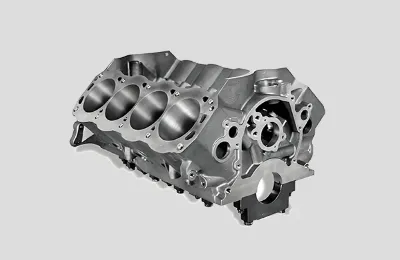
By Rapidefficient, You can complete product manufacturing in a short time, so as to be able to quickly enter the market.
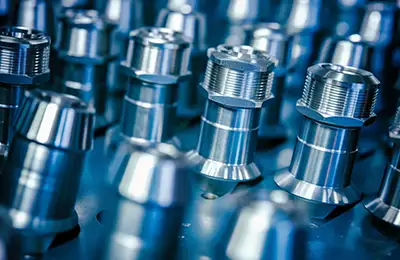
Efficient mold making is a cost-effective way, Able to bridge the gap between sample production and mass production. Quickly let your products occupy the market.
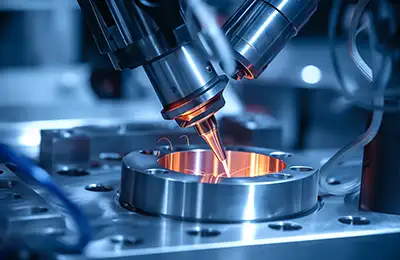
For custom projects, Our professional team will help you achieve the best products in terms of quality and efficiency.
All information and uploaded materials are secure and confidential
We provide new product developers with machined parts from engineering-grade materials suitable for functional testing or end-use applications. Get the CNC machining support you need by reading the FAQ.
1: Dimensional deviation
1. Check programming: Carefully check the coordinate values in the machining program, Tool compensation and other settings, Make sure it’s accurate.
2. Replace tools regularly: According to the wear condition of the tool, Replace tools regularly, Ensure the stability of processing dimensions.
3. Optimized clamping method: Use reasonable clamping methods, Reduce the impact of clamping force on the workpiece, Avoid workpiece deformation.
4. Regular maintenance of machine tools: Regularly perform accuracy testing and maintenance on machine tools, Ensure the positioning accuracy and repeatability of machine tools.
2: Surface roughness is unqualified
1. Choose the right tool: According to the processing requirements of aluminum parts, Choose the right tool edge radius, Material, etc.
2. Optimize cutting parameters: Properly set cutting speed, Feed amount, Cutting depth and other parameters, to obtain good surface quality.
3. Reduce vibration: Take steps to reduce machine tool, Vibration of the tool or workpiece, Such as adjusting the accuracy of machine tools, Change tool, Optimize clamping methods, etc.
4. Control the material quality of aluminum parts: Choose good quality aluminum parts materials, Avoid impurities in materials that affect surface quality.
3: Tool wear is too fast
1. Optimize cutting parameters: Reduce cutting speed, Feed rate and other parameters, Reduce the cutting load on the tool.
2. Choose the right tool: According to the processing requirements and material properties of aluminum parts, Choose the right tool material and edge radius.
3. Enhance cooling: Ensure adequate cooling during cutting, Reduce tool temperature, Extend tool life.
4. Improve tool quality: Choose good quality knives, Ensure the sharpness and hardness of the cutting edge of the tool.
4: Workpiece deformation
1. Optimized clamping method: Use reasonable clamping methods, Reduce the impact of clamping force on the workpiece. Multi-point clamping can be used, Uniform clamping, etc., Avoid excessive local stress on the workpiece.
2. Optimize cutting parameters: Reduce cutting forces, If the cutting depth is reduced, Feed amount, etc.,at the same time, Use the proper cutting sequence, Avoid cutting in weak areas of the workpiece.
3. Control processing temperature: Take steps to reduce the heat generated during cutting, Such as strengthening cooling, Use appropriate cutting parameters, etc.,Prevent workpieces from being affected by thermal deformation and processing accuracy.
4. Perform stress relief treatment: For some easily deformed aluminum parts, Can be stress relieved before processing, Such as annealing, Aging processing, etc., Reduce the internal stress of the workpiece, Improve machining accuracy.
5: Low processing efficiency
1. Optimize programming: Properly plan tool paths, Reduce idle tool time. at the same time, According to machine tool performance and processing requirements, Optimize cutting parameters, Improve processing efficiency.
2. Improve machine tool performance: If the machine tool performance is insufficient, Consider upgrading machine tools, Increase machine power, Performance parameters such as rotation speed.
3. Choose efficient tools: Choose tools with good cutting performance, Such as high speed steel cutting tools, Carbide cutting tools, etc., Improve processing efficiency.
4. Using multi-axis machining: For complex aluminum parts, Multi-axis machining center can be used for processing, Improve processing efficiency and accuracy.
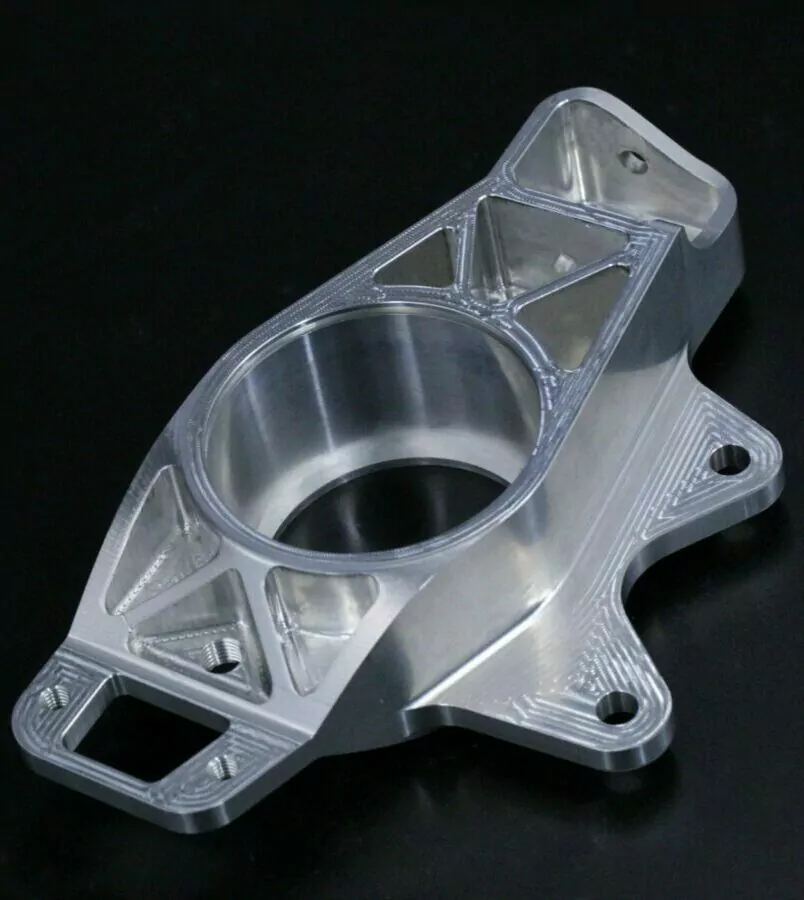
(1) High-precision processing
1. High dimensional accuracy: CNC (computer numerical control) machining technology enables very high dimensional accuracy, Tolerances can be controlled within a very small range, Generally can reach ±0.005 mm or even higher. This is critical for aluminum parts with stringent size requirements, Ability to ensure good fit between parts, Improve overall product performance and quality.
2. Good shape accuracy: Whether it’s a complex three-dimensional surface or a delicate geometric shape, CNC machining can be achieved accurately. For example, For aerospace aluminum parts with complex contours, CNC machining can produce the exact shape you need, Ensure aerodynamic performance and structural strength of parts.
(2) High-efficiency production
1. High degree of automation: CNC machining equipment is controlled by a computer program, Able to realize automated processing, Greatly reduces manual operation time and labor intensity. Once the program is set, The machine tool can run continuously, for mass production, Improve production efficiency.
2. Multi-axis simultaneous processing: Modern CNC machining centers usually have multi-axis linkage capabilities, Can control the movement of multiple coordinate axes at the same time. This enables the machining of multiple faces of complex parts in one setup, Reduces processing steps and clamping times, Significantly improved processing efficiency.
(3) Strong flexibility
1. Adapt to different design needs: CNC machining can quickly adjust the machining program according to different design requirements, No need to make complicated molds. Whether it is single piece customization or small batch production, Can handle it easily. For new product development and trial production, CNC machining enables quick prototype production, Shorten product development cycle.
2. Processing of various aluminum materials: CNC machining is suitable for various types of aluminum alloy materials, Includes high-strength aluminum alloy, Corrosion-resistant aluminum alloy, etc., Appropriate materials can be selected according to different application scenarios, Meet product performance requirements.
(4) Good surface quality
1. High smoothness: Through proper selection of tools and cutting parameters, CNC machining for good surface finish, Reduce subsequent surface treatment steps. For some aluminum products with higher appearance requirements, Such as electronic product casing, Automotive decorative parts, etc., CNC machining delivers high-quality surfaces.
2. good consistency: in mass production, CNC machining ensures consistent surface quality of parts, Avoids quality fluctuations that may occur in manual processing. This is very important to improve the overall quality and reliability of the product.
(1) High equipment cost
1. initial investment: CNC machining equipment is expensive, Especially high-performance multi-axis machining centers, Requires large amounts of capital investment. For small businesses or start-ups, Purchasing and maintaining these devices can be financially stressful.
2. Technology updates quickly: With the continuous advancement of technology, The technology of CNC processing equipment is also constantly being updated. To stay competitive, Enterprises need to continuously invest funds in equipment upgrades and technological transformation, This increases the operating costs of the business.
(2) High programming technical requirements
1. complex programming: For complex aluminum parts machining, Need to write complex processing programs. This requires programmers to have a high technical level and rich experience, Familiar with CAD/CAM software and CNC programming knowledge. otherwise, May cause program errors, Affect processing quality and efficiency.
2. Process optimization is difficult: In order to take full advantage of CNC machining equipment, Processing technology needs to be optimized. This involves tool selection, Cutting parameter settings, Processing path planning and other aspects, Requires extensive testing and analysis. For some special aluminum materials or complex processing requirements, Process optimization is more difficult.
(3) Tools wear quickly
1. Aluminum material properties: Aluminum is a relatively soft material, However, it is easy to cause knife sticking during the processing process. Causes tool wear to accelerate. also, Aluminum alloys may contain some hard particles, such as silicon, Iron etc., It will also increase tool wear.
2. High speed cutting requirements: CNC machining usually uses high-speed cutting technology, To improve processing efficiency and surface quality. However, high-speed cutting will subject the tool to greater cutting forces and heat, Further accelerates tool wear. therefore, Requires selection of appropriate tool materials and coatings, and reasonable cutting parameters, To extend the service life of the tool.
(4) Pressure on environmental protection
1. Cutting fluid treatment: CNC aluminum machining often requires the use of cutting fluids to cool and lubricate the tools. However, the use of cutting fluid will produce waste fluid, causing pollution to the environment. therefore, The need for effective treatment and recycling of cutting fluids, to reduce environmental impact.
2.Dust emission control: during processing, Will produce a lot of aluminum chips and dust. if not controlled, These dusts may pose a health hazard to operators, It will also cause pollution to the environment. therefore, Effective dust emission control measures are needed, Such as installing vacuum equipment, Use wet processing, etc.
Our CNC machining services have been praised by global customers from different fields. We supply CNC machining components to a variety of industries, Covers the following and more.

Large size parts, Such as CNC machined ABS bumpers, PC/ABS instrument panels and precision automotive parts, Reflector for example, lens, Steering wheel assembly, engine, transmission.
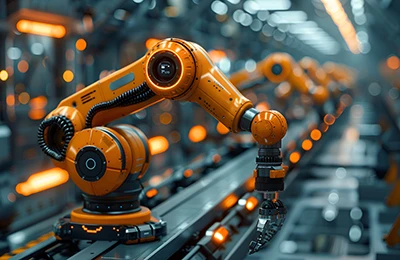
Robot parts for the robotics and automation industry, actuator, end effector, Motor, Automatic control equipment, Fixtures and housings.
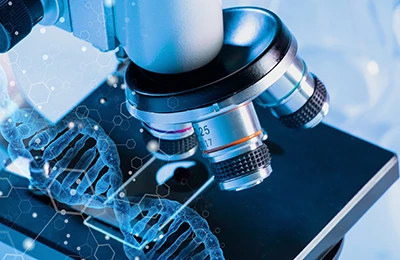
Stainless steel or titanium bone plate, prosthesis, respiratory equipment, handheld device, diagnostic equipment, anatomical model, Components for medical needs such as surgical instruments.

Aero engine, body, turbine, brake, tire parts, lighting system, Vacuum pump and fuel pump parts.

Consumer products, such as electronic equipment casings, button, handle, Knob, switch, wearable digital devices, Cookware products, sports equipment.
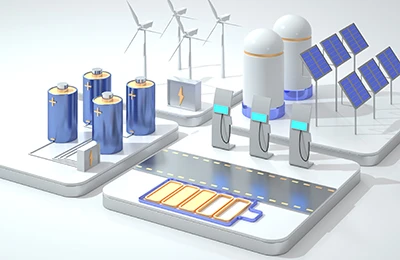
New energy industry components, e.g. heat exchanger, valve, pipeline, Pumps and accessories, Hydraulic components, Battery components, solar panel components, Frame and impeller.
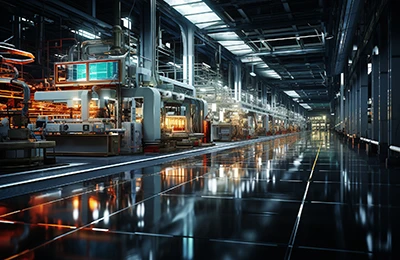
Electronic housing, conveyor belt, fastener, connector, Generator components, fixtures, Machine and tool parts for industrial machinery.
Actual models can be created based on semiconductor requirements, Engineering models and other experimental equipment, We work with universities around the world.

